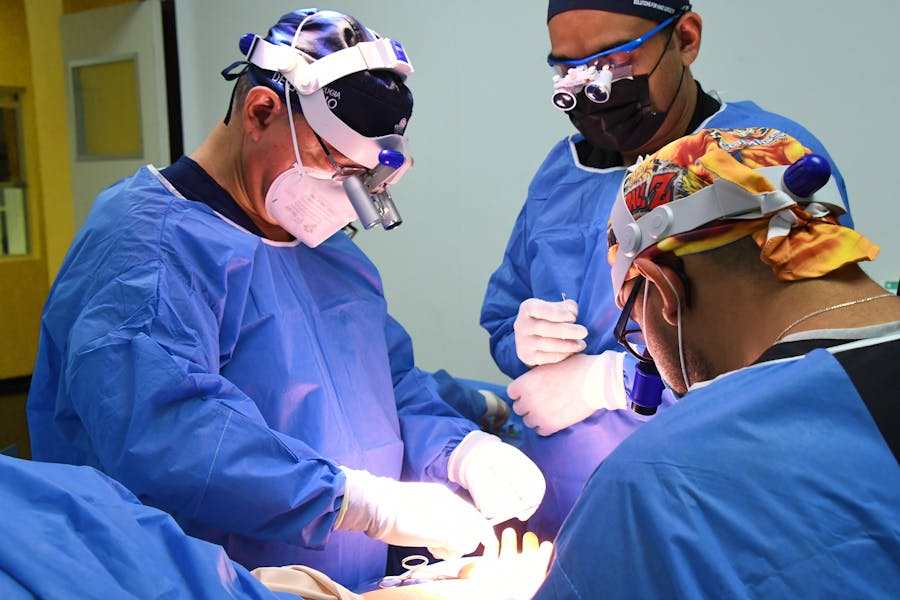Artificial Intelligence is making a real difference in various aspects of healthcare. It’s changing the way we look after patients, how we create healthcare apps, the process of discovering new drugs, and even the way we handle healthcare costs.
So, what can your medical facility gain from this? Let’s explore 10 benefits of AI:
Improved Medical Diagnostic Accuracy
Diagnosing certain diseases can be quite challenging. However, AI is up to the task. Dimitry Mihaylov, co-founder and chief science officer at Acoustery, thinks that AI can simplify the process of detecting diseases. Recent research supports this view, indicating that AI can identify conditions such as lung cancer and tuberculosis just as effectively, if not more so, than radiologists.
Use Case
For instance, Google Deep Mind has teamed up with Moorfields Eye Hospital to assist doctors in diagnosing and comprehending eye diseases more effectively. Additionally, it plays a role in simplifying the planning of radiation therapy.
Quicker Data Handling
Healthcare providers are generating a massive 137 terabytes of data every day. With such an overwhelming amount of patient data accumulating, AI can come in handy. Using its neural networks and image recognition capabilities, AI can efficiently sort through this vast amount of data and help make accurate decisions that lead to better treatment options.
Use Case
Change Healthcare employs AI for various purposes including data analytics, enhancing patient engagement, and providing collaboration tools. These tools are designed to connect payers and providers, aiming to streamline and reduce inefficiencies in workflows.
Reducing Medical Mistakes
AI is showing real promise in cutting down on errors when it comes to predicting and diagnosing illnesses. This could be a huge deal, especially now that our healthcare system is under so much pressure. Take breast cancer diagnosis, for instance – a recent study found that using AI brought error rates down from 3.4% to a mere 0.5%. That’s a big improvement.
Use Case
Diagnoss has developed an AI medical coding engine that reviews doctors’ notes as they’re written and recommends the correct codes. This helps in significantly reducing coding errors on insurance claims.
Robotic Assistance In Surgical Procedures
AI can play a crucial role in surgical preparation, guiding the procedure, and carrying out robotic tasks. By using predictive analytics, AI can anticipate potential risks, lower the likelihood of complications, and offer a detailed view before surgery.
Use Case:
At Maastricht University Medical Center, an AI-powered robot was used to conduct microsurgery. Additionally, Vicarious Surgical’s robotic system is helping surgeons perform precise, minimally invasive operations.
Personalized Healthcare
AI is changing the game when it comes to tailoring how we manage patient care, especially with telemedicine. It’s like having a smart assistant that can look at a patient’s data, figure out their specific health risks, and then suggest a treatment plan just for them. This can make the whole care process more efficient, get better results for patients, and even save on healthcare costs. Plus, it takes some of the paperwork off doctors’ plates, so they can spend more time looking after their patients.
Dimitar Mihaylov believes that AI is crucial for personalized medicine. He points to asthma treatment as an example, emphasizing that its effectiveness hinges on personalization – a task where AI can be particularly helpful.
Use Case
OM1’s platform, PhenOM™, utilizes AI along with OM1’s extensive health data sets to pinpoint risks and opportunities. This enables it to provide tailored insights into healthcare, influencing a wide range of areas from research to clinical decision-making.
Downsides Of AI In Healthcare: Understanding The Challenges
AI in healthcare brings many benefits, but there are still some challenges we need to tackle.
Dependability And Potential Hazards
Healthcare providers are cautious about using AI tools like ChatGPT. Their biggest concern? The possibility of getting incorrect information. The effectiveness of AI largely depends on the quality of the data it’s trained on. If this data isn’t well-rounded, the outcomes can be unreliable. And honestly, incorrect diagnoses or treatment recommendations could have serious negative impacts on patient care.
Continuing Biases In Healthcare Practices
Another issue is that ChatGPT sometimes continues to show the same biases that are common in healthcare. This happens when the AI is trained mostly on data from specific groups, leading it to be less fair towards others.
It’s important to remember that AI isn’t authorized to diagnose, treat, or prescribe on its own. It always needs a human guiding it. However, AI has been tested in fields like CT, MRI, and X-ray interpretation, with varying success. Initially, the AI model faced criticism for providing biased and sexist responses, but these issues were addressed in later updates.
Gaps in Ethnicity Data And Lack Of Minority Representation
Creating AI models requires a lot of data, which comes from various sources including healthcare websites and scientific studies. However, a big problem is that many healthcare studies often overlook information about ethnicity. As a result, ethnic minority groups are not well-represented in research trials. For more insights into AI development in healthcare, visit Linkup Studio.
Conclusion
Artificial Intelligence is becoming a big part of healthcare, opening up many new opportunities. It’s helping to improve how we diagnose diseases and find new medicines. AI is also making healthcare more efficient by helping with paperwork and disease prevention. This technology is a great support for both patients and healthcare workers.
In the future, we’re going to see AI play an even bigger role in healthcare. As we keep researching and coming up with new ideas, we should expect some great improvements. The aim here is to make sure that healthcare gets better and more personalized for everyone.
We’re just at the beginning of using AI in healthcare. There’s so much it can do to help people and maybe even save lives. We mustn’t just see this as a choice, but as something we need to do for everyone’s health.
For more information on AI development services, check out here: https://linkupst.com/services/ai-development/.
Watch this video to learn more about the impact of AI in healthcare: https://www.youtube.com/watch?v=uCqIooXwYVw.














